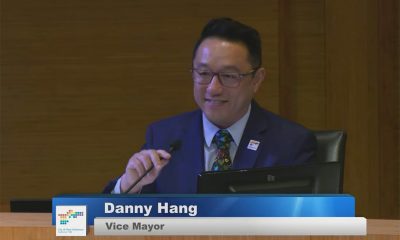Politics
How Stonewall Democratic Club retaliated against critics of its president
Stonewall Democratic Club is a powerful force in local politics, especially in the LGBTQIA+ enclave of West Hollywood.

By Kate Gallagher | LOS ANGELES – “I know the ugly side of politics quite well. Any endeavor that involves human beings, there’s going to be mischief somewhere,” said Lauren Buisson. “The system feeds on cronyism and self-dealing, and that’s what I saw at Stonewall.”
Buisson was a member of Stonewall Democratic Club’s Steering Committee until she was dismissed from her position in October 2018. Her capital offense was calling out the racist, transphobic, and otherwise inappropriate Facebook posts made by the organization’s president, Lester Aponte — whose current campaign for a third term as Stonewall president has the support of dozens of elected officials and Democratic Party leaders.
Stonewall Democratic Club is a powerful force in local politics, especially in the LGBTQIA+ enclave of West Hollywood. The organization’s leadership includes high-ranking members of the local, state, and national Democratic Party. Each election cycle, candidates for everything from the Santa Monica School Board to the U.S. Senate vie for Stonewall’s endorsement, a symbolic stamp of approval from the LGBTQIA+ community.
But beneath the veneer of progressivism, several current and former Stonewall members describe a toxic environment of harassment, bigotry, and abuses of power, where dissent is silenced and misconduct is swept under the rug.
“It’s just a really twisted culture about personal gain, personal access, and nothing about advancing LGBT standards of living,” said Craig Scott, a lifelong LGBTQIA+ activist who served on Stonewall’s Steering Committee from 2017 to 2018. “
Sean Kolodji was an enthusiastic young activist when he joined Stonewall in 2009. He soon got involved in the membership team, where he was responsible for recruiting and credentialing new members. By 2015, he’d been appointed to the Steering Committee as Membership Chair. “I felt like we’re really fighting for something,” he said. “We’re fighting for LGBT rights, fighting for the trans community, fighting for diversity, and I was passionate.”
But cracks in the facade quickly started to show. In April 2017, Kolodji won a Stoney Award — the organization’s annual award ceremony/fundraiser — for Member of the Year. Eric Bauman, longtime Stonewall president and then-LACDP Chair, was also there to accept the Public Official of the Year Award.
Bauman, who later resigned as CDP Chair amid sexual misconduct allegations, was “very handsy with everyone,” Kolodji recalled. At one point during the dinner, Bauman began massaging Kolodji’s 20-year-old guest while still seated at the table.
According to several former members, Bauman’s inappropriate behavior was an open secret at Stonewall. None of the club’s leadership ever intervened.
“The pain that we experienced in dealing with the way Eric Bauman interacted — what example did he set for us about how we get power?” Kolodji said. “I feel like there was a structural problem, where we didn’t set the ground rules and say, look, within a professional space we can’t do this.”
That summer, Kolodji was elected to Stonewall’s Executive Team as Communications Vice President. Just days later, Gemmel Moore was found dead in the home of prominent Democratic donor and Stonewall Steering Committee member Ed Buck.
Kolodji, Scott, and Alex Paris, who served as Social Media Chair, pushed the club to publicly disavow Buck’s behavior, and to donate $500 (the cost of Buck’s lifetime Stonewall membership) to Moore’s funeral expenses. They received pushback from several other Steering Committee members, including Aponte, Garry Shay (who serves as the parliamentarian for both Stonewall and the LACDP), and John Erickson, now a member of West Hollywood City Council.
“There were a lot of people in the party that just wanted to be quiet,” Kolodji said. He recalled that, when Black activists posted on Stonewall’s Facebook page asking where the organization stood on Buck’s behavior, Aponte asked that the posts be deleted.
Even once the Steering Committee voted to put out a statement regarding Moore’s death, Aponte fought to soften the statement’s language and frame it around the dangers of drug addiction, rather than Buck’s suspicious role in Moore’s overdose.
“They didn’t want to kick [Buck] out because he gave so much money to the club,” said Scott. “Lester was always like, we can’t jump to conclusions, we need more information.”
Although Buck soon resigned from the Steering Committee, Moore’s death, and the tepid reactions from the rest of the club’s leadership, was a tipping point for Kolodji. “Those experiences together radicalized me a little bit,” he said. “This organization has something rotten at its core, and I can’t just go along with it.”
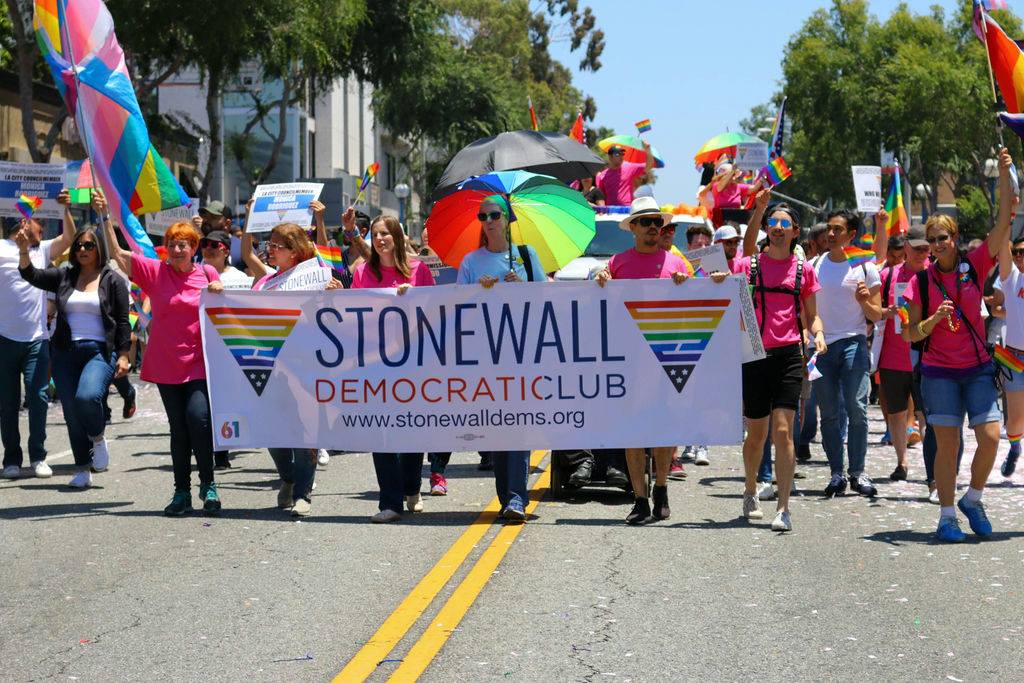
Lauren Buisson joined Stonewall in the summer of 2017, just after the Ed Buck scandal broke. “I actually went to some other [organizations’] events, and of all the ones I went to, the only person who chatted me up as a potential recruit was Sean.”
Kolodji and Buisson met at the annual Stonewall BBQ, hosted at the family home of State Assemblymember Reggie Jones-Sawyer. Buisson soon signed on to join Kolodji and Alex Paris on Stonewall’s communications team, where she managed the club’s social media and led writing and production on the Stonewall Spotlight podcast.
“Alex, Sean, and I worked really, really well together. We had the same social justice driven agenda,” Buisson recalled. “[But] I noticed the problems in the organization almost from the jump. And it especially became clear when the first crisis in the assembly happened.”
In late October 2017, Assemblymember Raul Bocanegra was accused of sexual misconduct. Just a week later, similar allegations surfaced against state Senator Tony Mendoza. After the news broke, Buisson, Paris, and Kolodji led an effort to convince the Steering Committee to draft a statement condemning the two officials’ behavior.
However, Eric Bauman, who at that point was no longer a member of Stonewall’s Steering Committee, stepped in and cautioned them not to move forward with the statement. Buisson found his involvement alarming.
“You had this guy who was himself a serial sexual harasser stepping into club business when he was no longer supposed to be involved,” she said. “Parts of the California Democratic Party like to assert that they have no control or association with the clubs. They absolutely do.”
The statement, drafted by Buisson, was eventually approved by a majority of the Steering Committee, over the objections of Aponte, Garry Shay, and Political Vice President Jane Wishon. As soon as the votes were in, Kolodji sent out the statement.
Immediately afterwards, Aponte confronted Kolodji for “going behind his back” by releasing the statement without his prior approval. Kolodji was baffled, since Aponte had put him in charge of counting the votes for the motion. “It showed that Lester and Garry and the power in the organization were uncomfortable with this kind of rebellion of the grassroots,” he said.
In the coming months, Buisson, Kolodji, Paris, and Scott frequently came into conflict with the rest of the Steering Committee. They were the only four Steering Committee members to vote against accepting a donation from Wells Fargo Bank, which had recently been rocked by a storm of scandals. Aponte ultimately decided to decline the donation after Kolodji leaked the news to LA Health Commissioner and former Stonewall Steering member Susie Shannon, who vagueposted about it on Facebook.
It gradually became clear to Paris that Stonewall’s leadership was “completely ignoring the important mission that this organization was started for… They’re more concerned with consolidating power, more concerned with glad-handing politicos and influence sharing than they are with actually helping LGBT people.”
The political disagreements sometimes turned personal. While discussing endorsements for the 2018 election, Scott, a longtime San Francisco resident, criticized Sen. Dianne Feinstein’s history of moderate positions and suggested that the octogenarian was getting too old to do her job effectively. In response, Erickson criticized Scott’s comments as “ageist” and sent an email to the Executive Team suggesting that Scott should be removed.
“We looked at it, and we were like, okay, this isn’t… this is silly, right?” Kolodji recalled.
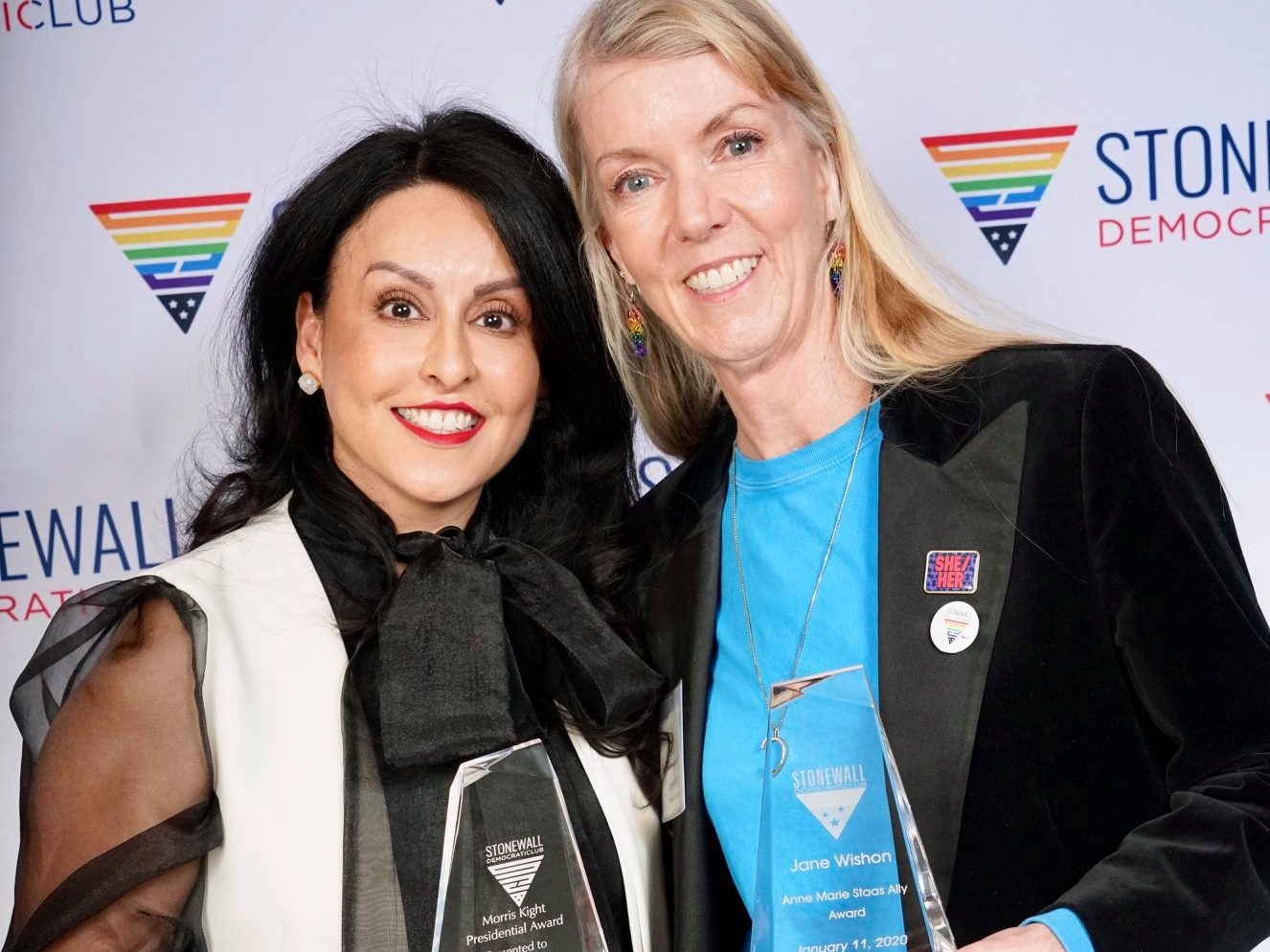
A more serious point of contention was the lack of diversity in Stonewall’s leadership. Of the eight elected officers, there’s currently only one who isn’t a cisgender man — Jane Wishon, who is a straight white woman. While officer positions are open to anyone, including straight allies, the lack of representation for LGBTQIA+ women within the club’s leadership is reflective of a larger problem, not just at Stonewall but in politics and LGBTQIA+ spaces in general.
In 2010, Aponte was on the board of a pro-marriage-equality organization called “Love, Honor, Cherish,” which crafted a failed ballot measure to overturn Proposition 8. The organization, which was entirely composed of cisgender gay men, failed to include any mention of gender identity in the measure.
In response to a Facebook post about the lack of trans-specific language, Aponte said that none of the over 100 activists who were involved in the discussions ever raised any concerns. He seemingly recognized the problem with the group’s lack of diversity without claiming any responsibility for fixing that problem, simply saying, “Obviously we needed some of you in the room. The door has always been open.”
To Hannah Howard, this sounded like a cop-out. Howard, who is trans, attended one Stonewall meeting in 2005, but decided not to engage further after being repeatedly misgendered during the meeting. She was surprised when, just a few years ago, a Stonewall member made a Facebook post about the reasons why trans people have trouble engaging with the movement — and Aponte responded with incredulity.
When Howard commented sharing her experience at the 2005 Stonewall meeting, Aponte “was shocked, disbelieving that such a thing could happen, but talking about [how] they were such great allies now,” she said.
However, according to current Steering Committee member Mackenzie Hussman, not much has actually changed. She recalled that, during a Pride event in 2018, a newer member of the Steering Committee, who is a trans woman, was working at Stonewall’s booth. An older man on the Steering Committee didn’t recognize her, and accused her of stealing from the booth. The incident was addressed awkwardly at the next Steering Committee meeting.
“Lester gave some sort of wash-overstatement like, ‘Oh we try to be inclusive of everyone.’ And then he proceeded to ask this trans woman how she would like to be treated,” Hussman recalled. “It just felt so insensitive. We’re an LGBT club, we should already know how to welcome trans members into our community. And she was publicly singled out in front of 30 people. It was embarrassing.”
In another example of Stonewall’s lukewarm commitment to inclusion, two Black LGBTQIA+ candidates, Steve Dunwoody and Ashley Marie Preston, intended to run in the 2018 special election for Assembly District 54. However, Wishon, as Vice President of Politics, made the decision that Stonewall shouldn’t endorse or support either candidate, because it would be “too divisive for us to choose between a Black gay man and a Black trans person,” according to Kolodji. In the end, neither candidate even made it onto the ballot.
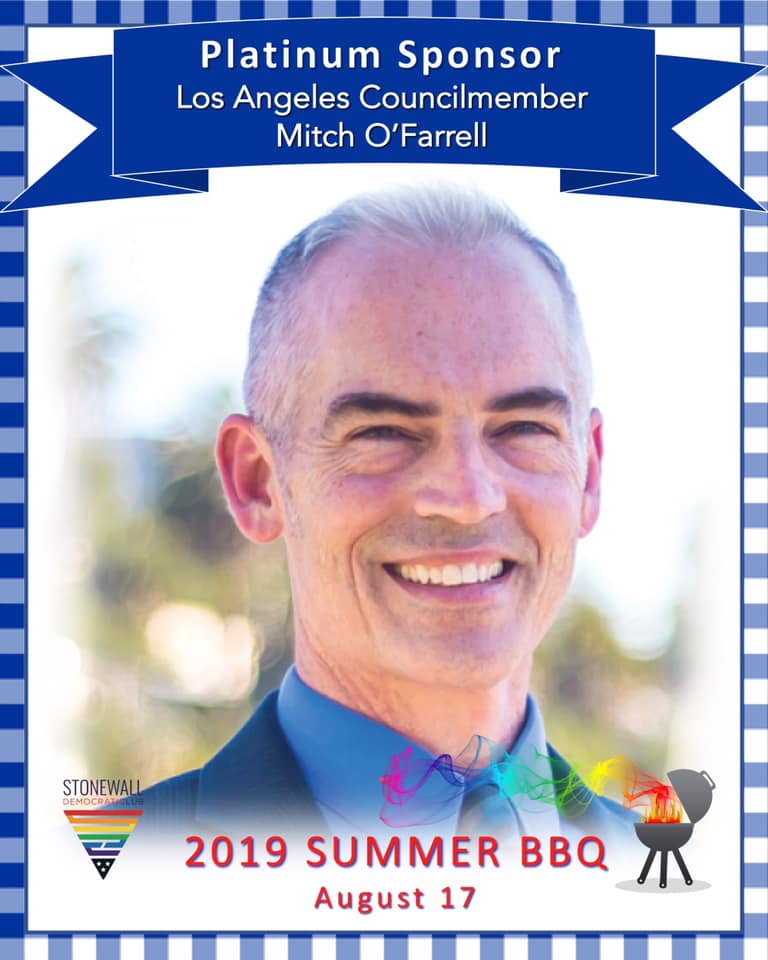
In April 2018, Buisson posted an article to the Steering Committee’s private Facebook group about the need for more Black women in Democratic Party leadership. All hell broke loose.
Shay replied that Buisson’s post was “not productive,” and instructed Operations Vice President Steve Bott to remove the post. When Buisson noticed it was gone, she posted the article again. It was removed again, and Buisson was blocked from further posting in the group.
“I’m 6’1″ and 245 pounds. I don’t let men tell me when I can talk and when I can’t,” said Buisson. “You could throw a brick and not hit a person of color at these general meetings. This was a problem we needed to address internally. And they refused.”
Buisson brought her concerns to Kolodji, who raised the issue with the rest of the Executive Team, including Aponte, Shay, Wishon, and Bott. All four replied that any criticism of the Democratic Party is unwelcome on the Steering Facebook page.
Kolodji repeatedly pointed out the irony of silencing a Black woman for calling out the Party’s silencing of Black women. Aponte, who is Puerto Rican, is the only person who responded to this point — he replied mystifyingly, “The real irony is that the only ethnic minority in this thread is me.”
At the time, Stonewall had no official grievance process — if Buisson wanted to press the issue further, it would be judged by the Steering Committee, which was overwhelmingly white and male.
Interestingly, Wishon had said that “no one is trying to censor Lauren on her own page,” and Aponte agreed that Buisson and Scott (whom no one else had mentioned) had “the entire wide world web” to post whatever they wanted. They quickly changed their stance on this.
Just a few weeks later, Scott shared a link to a video on his personal Facebook page with the comment, “Fag hags need to be checked so often.” The video depicted a brawl between a group of intoxicated white women and a group of queer men of color in an alley in West Hollywood.
However, the Executive Team interpreted Scott’s comment differently. Within hours, the officers had been looped into an email with the subject line “URGENT: Regarding post encouraging violence against women.”
Scott insisted that his comment was meant to condemn the violence. “There’s this ongoing debate within the LGBT, especially gay men, culture about the appropriateness of straight women and bridal showers going to gay spaces,” he told Knock LA. “So I just said you got to check your fag hags because you don’t want them beating up on queer people. I basically saw it as a gay bashing.”
Shay recommended that the board should immediately ask for Scott’s resignation. Wishon agreed. Attaching a screenshot of an unrelated Facebook comment by Buisson, she added, “And Lauren…”
By the next day, seven of the eight officers had signed a letter calling for Scott’s resignation. Kolodji was the only one who dissented. While he agreed that Scott’s post was “in very poor taste,” he told the rest of the Executive Team that he didn’t feel it was a resignation-worthy offense.
Neither did Scott, who deleted the post but refused to resign. At that point, the Executive Team (except Kolodji) motioned for the formation of an investigation committee to address the issue.
The committee presented its findings at Stonewall’s June 25 general membership meeting. The room was packed. “They called all the members who don’t normally show up, describing [Scott] as this misogynist who’s endorsing violence against women,” Buisson said.
LACDP Chair Mark Gonzalez was brought in to preside over the session. DNC member Laurence Zakson served as Parliamentarian. Scott himself chose not to attend the meeting, but Buisson led the defense on his behalf.
“It was a circus,” Kolodji said. One LACDP leader described the proceedings as “absurd.” At one point, West Hollywood City Councilmember John Heilman called impatiently from the back of the room, “Let’s vote already!”
In the end, the members voted, 48 to 14, to remove Scott from the Steering committee. That was the end of his involvement with Stonewall.
Regardless of whether or not Scott’s post should have been considered grounds for dismissal, the affair revealed a glaring double standard for whose inappropriate behavior is, or isn’t, punished. Just a year earlier, Stonewall had vigorously supported Eric Bauman’s campaign for CDP Chair, despite his well-known sexual misconduct.
“They all jumped on [Scott] because they wanted to get rid of a critical voice,” Buisson concluded.
Throughout the controversy, Kolodji had warned the rest of the Executive Team that “people in glass houses shouldn’t throw stones, so to speak. Be careful pursuing this with Craig, because this is an abuse of power, and you’re setting a precedent that is going to come back.”
Kolodji had been Facebook friends with Aponte for years, and he was aware of several posts Aponte had made that were just as offensive, if not worse than the comment that led to Scott’s removal. He mentioned this to Buisson, who began combing through Aponte’s most problematic posts.
In October 2011, Aponte posted a link to an article about Hermain Cain with the comment, “I hear the camp is iin [sic] the Spik Valley and overlooks Gook Mountain. Ain’t Texas grand?”
In November 2014, he posted an article about Mia Love, a Black Mormon Republican recently elected to Congress, commenting: “Until 1972, official Mormon Church doctrine was that Black people were evil and could not be saved. Perhaps this is their way of proving it?”
In 2015, he deliberately misidentified Ann Coulter as trans: “I am saying Ann Coulter is transgender. Go ahead and sue me.” The comments on the post became filled with vitriolic anti-trans and misogynistic remarks. Aponte did nothing to stop the hateful discussion.
In 2016, Aponte liked an anti-BLM post that said, “I think these people are assholes. There I said it. I’ve grown to despise BLM because of their tactics and narrative.”
In 2017, he joked that immigrant activists should be deported.
In 2018, Aponte described the Inclusive Pride Flag as “stupid.”
Buisson compiled 18 pages of screenshots of these and other inappropriate remarks. It was already clear to her that taking her concerns to the Steering Committee would be futile.
“It was not just about this one bigoted individual,” Buisson said. “It was infecting. You could see it in who was in the club, who was in leadership positions, who spoke from whom, who was excluded, the whole system was infected. And in my view at the time, that fish was rotting from the head.”
So, rather than rely on the club’s leadership to discipline themselves, Buisson sent the offending posts to several elected officials, asking them to withdraw their support for Stonewall until Aponte resigned.
Not a single official responded.
One of the recipients was Assemblymember Reggie Jones-Sawyer, host of the annual Stonewall BBQ — which was coming up in just a few weeks.
“My feeling was, as somebody with a reputation for advocating for the Black community, this man might be a little bit pissed off about these racist things,” Buisson said. “It would be no problem for him to say, this event is canceled until you resign. You’re out of Stonewall or doesn’t go forward.”
Jones-Sawyer’s office did reach out to Stonewall’s leadership — but not to demand Aponte’s resignation. Instead, they passed along Buisson’s letter, fingering her as a whistleblower.
A few weeks after her letter-writing campaign began, Buisson suddenly found herself locked out of Stonewall’s digital assets and social media accounts. Paris, who chaired the social media team, called Aponte in confusion. Aponte informed him that Buisson was no longer allowed to serve on the communications team.
“I said, what are you talking about, you’re just [removing] her?” Paris recalled. “And [Aponte] is like, ‘yeah, I can do that, I’m president.’ I was like… pretty sure you can’t.”
When Aponte realized that he could not, in fact, unilaterally remove Buisson from her Steering Committee position, he told Paris and Kolodji to ask for her resignation. They refused.
On September 26, Aponte sent an email to the full Steering Committee revealing that Buisson had sent letters to several elected officials accusing him of making “racist and bigoted statements.” Without revealing any details about the “statements” in question, Aponte called Buisson’s accusations “false and defamatory… harmful, not just to my personal reputation, but the reputation and public standing of our organization.” He asked that the Steering Committee vote on whether to expel Buisson from her position.
In stark contrast to Scott’s widely-publicized hearing, Buisson’s removal was handled quietly at a Steering Committee meeting on October 4. So quietly, apparently, that Wishon told Knock LA she didn’t remember the meeting had even happened — although the minutes confirm she was in attendance.
“There were wild allegations and actual shouting matches at this meeting,” Paris recalled. “That was an absurdly fireworks meeting over an issue that was not taken seriously.”
Buisson chose not to attend the meeting, but Paris and Kolodji argued on her behalf that the real problem at hand was Aponte’s behavior, not Buisson’s. Even if the committee didn’t feel that Aponte’s Facebook posts were grounds for resignation, his attempt to retaliate against Buisson was itself an abuse of power that warranted investigation.
However, other Steering Committee members said that Buisson should have brought the issue directly to them — which Kolodji found ludicrous, given their handling of Buisson’s previous complaints. “We tried to deal with this stuff internally,” he said. “But it seemed like their side was kind of like, ‘we’re gonna use our power — and we have more power — to essentially drive you out.”
The Steering Committee ultimately voted, 17 to 3, to remove Buisson from her position. Paris resigned the same day in protest. Kolodji soon disengaged from Stonewall as well.
“The organization just seemed destined to be an unredeemable mess,” Kolodji said. “Is there no shame, to just ruthlessly try to target someone that we need as a leader in queer spaces? And instead, what do we get?”
As a parting shot, Kolodji and Paris motioned for a separate investigation into Aponte’s Facebook posts. The motion was approved, and an Ad Hoc Incident Review Committee was formed to review the posts. The five-member committee included Aponte’s longtime ally, Garry Shay.
Knock LA obtained a copy of the investigation’s report, which was finalized in June 2019 and sent only to the eight members of the Executive Team. In Aponte’s statement to the committee, he defends each of his insensitive posts, which he maintains are not “racist [or] bigoted.” He claims Buisson only called out his comments because of a “personal vendetta.”
The committee’s assessment notes that Aponte’s posts are in “poor taste” and that each of the committee members would “know better than to make these kind of comments.” However, they largely accept Aponte’s justifications, some of which strain credulity (in one example, he insists that his sarcastic use of racial slurs “was in no way meant to condone the use of racial slurs in place names, but rather the opposite.” He doesn’t elaborate further.)
Ultimately, the committee decides that the posts are not grounds for Aponte’s removal. The report concludes: “What appears most important now is to move forward from this point.”
It’s unclear whether the investigation’s findings were ever revealed to the full Steering Committee or the membership at large. Wishon claims the investigation’s report was presented at a general membership meeting; however, Knock LA reviewed the minutes for every meeting from 2018 to June 2021, and there is no mention of the incident review committee’s existence.
According to a current Steering Committee member, at some point Aponte made a brief apology and deleted the Facebook posts, but that’s where the consequences ended. In May 2019, Aponte was nominated, unopposed, for a second term as president. Three of the five members of the official nominating committee were also involved in the incident review committee, whose investigation into Aponte was still ongoing.
Ultimately, Aponte was reelected, and his now-deleted racist Facebook posts were seemingly never mentioned again. During this same time, however, Stonewall was implicated in a wave of controversies that weren’t so easily swept under the rug.
In November 2018, Eric Bauman resigned as CDP Chair after an onslaught of sexual harassment allegations. In January 2019, a second body was found in Ed Buck’s apartment. Later that year, a third victim narrowly escaped from Buck’s home alive, and Buck was finally arrested. He was eventually indicted on nine counts by a federal grand jury, and his trial is currently underway.
Meanwhile, in November 2020, John Erickson, a major player in several of Stonewall’s internal scandals, was elected to West Hollywood City Council, thanks in part to the resources that came along with his endorsement by Stonewall. Notably, four of the eight eligible candidates were inexplicably barred from participating in Stonewall’s endorsement process, and although two council seats were open, Stonewall’s membership voted to endorse only Erickson — Sepi Shyne, an LGBTQIA+ woman of color, failed to reach the 60% vote threshold for endorsement.
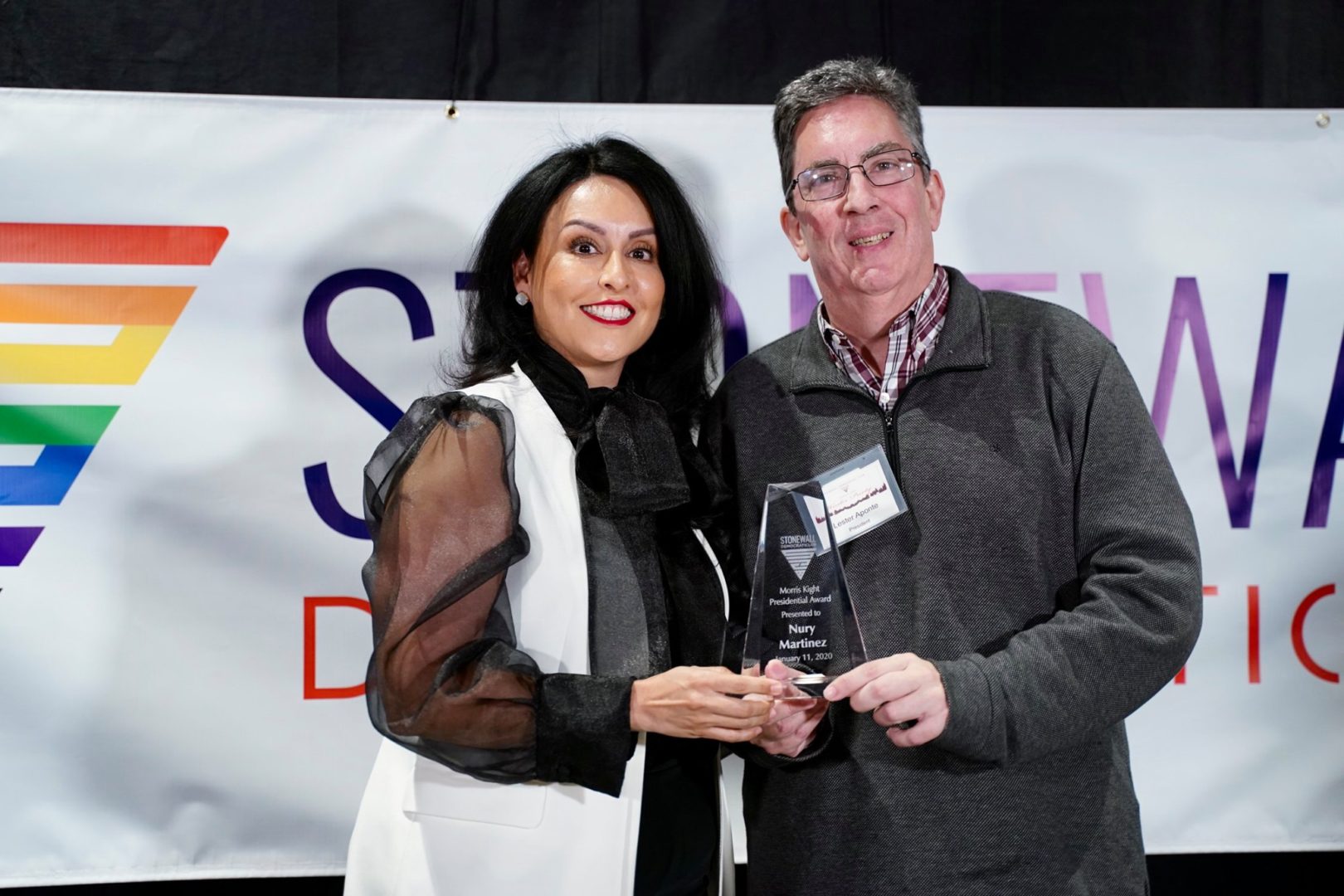
On May 24, Aponte announced his candidacy for a third term as Stonewall president. Interestingly, the same day as his announcement, he changed his Facebook cover photo to the Inclusive Pride flag that he previously decried as “stupid.” His slate, which is running on a platform of diversity and inclusion, includes five men and one straight woman (Wishon).
This time, however, Aponte isn’t the only candidate in the running — although he was chosen by the official nominating committee, another Stonewall member submitted a nomination for Alex Mohajer, who currently serves as Chair of Public and Media Relations.
According to Mackenzie Hussman, this year’s election has been tense from the very beginning, when the nominating committee itself was being chosen. “I felt rushed,” she said. “They were trying to put select people through who would nominate whoever [the current officers] wanted to.”
When other Steering Committee members spoke up and suggested different names for the nomination committee, there was procedural confusion. “They were just shocked that people would not go with what they were saying,” Hussman said. “It’s just been very key prominent people running this club without check or challenge, and now there’s people challenging them. You can tell they feel threatened.”
Hussman notes that Aponte has personally blocked several Steering Committee members on Facebook, ostensibly for opposing his campaign for reelection. In a blast of deja vu, Hussman, who is Chair of Social Media, and another communications team member were both inexplicably locked out of Stonewall’s social media accounts on July 12 with no explanation, although their access was restored when the issue was brought to Operations VP Bott’s attention.
According to Hussman, the only people who could have revoked the access are Bott, Aponte, and Wishon. When Knock LA asked Wishon about the incident, she explained vaguely, “The Operations team examined all our permissions on the website and socials. Two members were moved to different permissions on [Facebook], but as soon as Operations was made aware that the previous level was required in order to stream they were moved back to their original levels.”
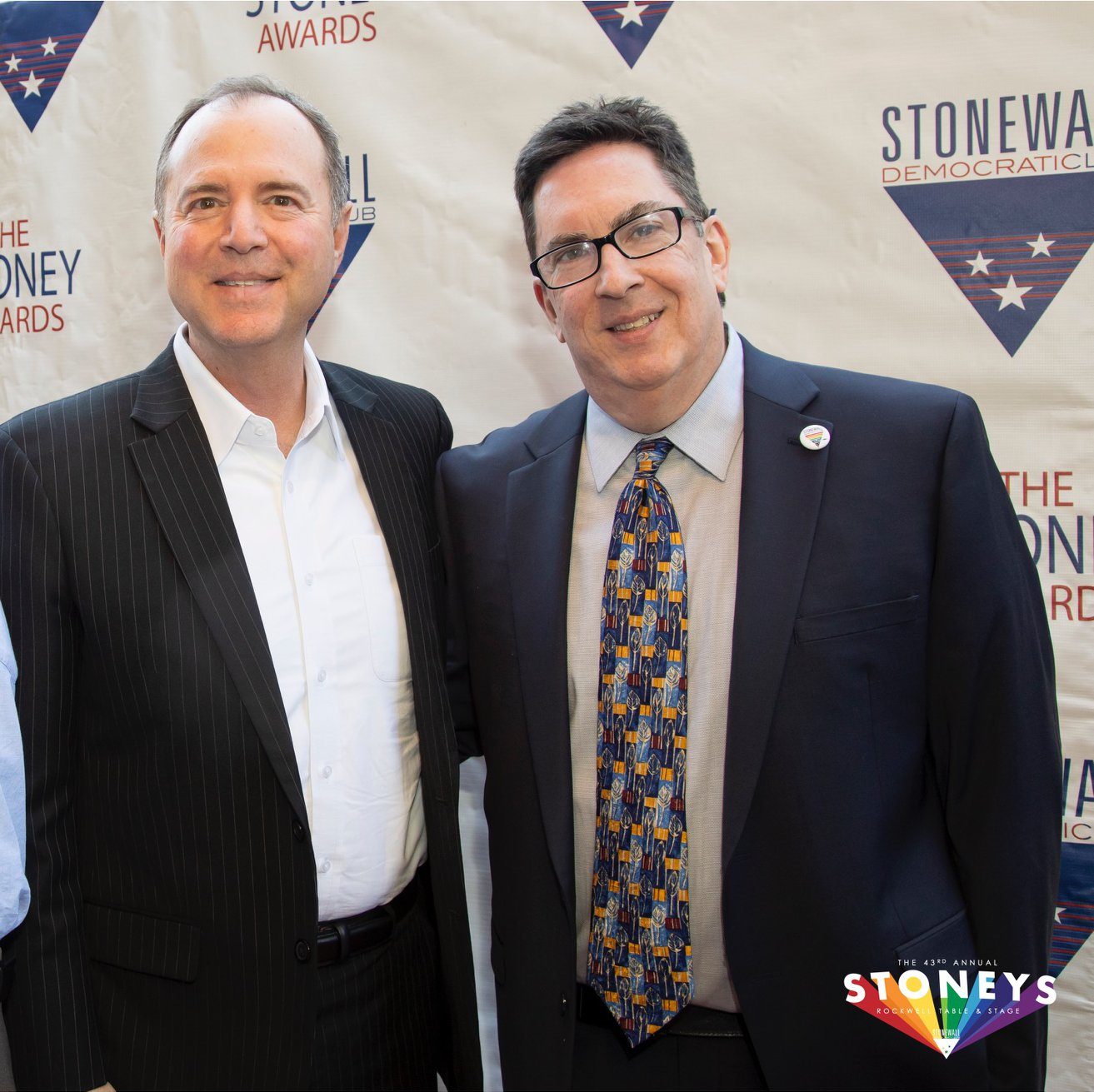
Despite the internal dissent, Aponte still enjoys widespread support from the Democratic establishment. His reelection campaign has been endorsed by John Erickson; West Hollywood Mayor Lindsey Horvath; State Assemblymembers Reggie Jones-Sawyer, Laura Friedman, Jesse Gabriel, and Isaac Bryan; State Senators Ben Allen, Anthony Portantino, and Sydney Kamlager; LA City Councilmembers Paul Koretz and Mike Bonin; LA County Supervisor Holly Mitchell; LACDP Chair Mark Gonzalez; CDP Executive Director Yvette Martinez; and at least six DNC members.
As this roster of supporters suggests, the implications of Stonewall’s internal drama extend far and wide through state and local politics.
To Buisson, the problems at Stonewall are emblematic of a larger problem with how the Democratic Party treats marginalized communities, particularly the Black women on whose votes and volunteer labor they rely. She notes that the refusal to prioritize the needs of diverse communities could be an existential threat to the Party’s survival.
“Juneteenth does not make up for George Floyd. And Kamala Harris does not make up for all the slights that women of color suffer,” she said. “[Last year], the entire region went ultra progressive. We had a record turnout. And yet they’re still trying to preach to us, you know, what the well-heeled people want. You think that they would realize where this is headed… The younger voters are willing to suffer through a Republican administration to teach the Democrats a lesson.”
But perhaps one of the most worrying consequences of Stonewall’s toxic culture is the impact on the LGBTQIA+ community. “I don’t want these creeps mentoring our queer youth. I don’t want them jaded and cynical after their first election,” Buisson said. “We can’t have vulnerable people having weak leaders or corrupt leaders. That does harm to our children and makes them even more isolated.”
“I think at the end of the day, this is about restoring the important place that organizations like Stonewall play in the progressive movement,” Paris added. “We can sit by and let the party apparatus do what it’s going to do to protect its insular interests, or we can stand up and fight back for the interests of the people that the party proclaims that it is in service of.”
Buisson believes the first step is to expel Aponte, not just from Stonewall, but from the CDP, where he currently serves as co-chair of the LGBT Caucus. Beyond that, she suggests that the LACDP should temporarily revoke Stonewall’s charter — essentially disaffiliating the organization from the Democratic Party — until the internal issues are addressed.
This seems unlikely to happen, given that the LACDP’s executive director and parliamentarian are both members of Stonewall’s Executive Team, and LACDP Chair Mark Gonzalez has endorsed Aponte’s reelection campaign. But Buisson is hopeful that public pressure from elected officials could be enough to turn the tide and hold Aponte accountable.
“It’s one call from one of them… to the chair of the state party, to expel him, and to sanction Stonewall,” Buisson said. “It’s one call [from] one elected. That’s all it takes. And I’m laying down that gauntlet. Which one of you is it going to be?”
Knock LA contacted Aponte, who responded with a completely blank email. Garry Shay declined to comment. John Erickson didn’t respond to requests for comment.

Kate Gallagher is a freelance journalist and writer based in Los Angeles. She is also a Senior Content Writer for Parcast Studios on Spotify.
Gallagher is a graduate of the University of Iowa with a Bachelor of Arts degree in English Language and Literature.
The preceding article was published at KnockLA, a Los Angeles based non-profit community journalism project and is republished by permission.
Congress
Padilla speaks at ‘ICE Out for Good’ protest in D.C.
ICE agent killed Renee Nicole Good in Minneapolis on Jan. 7
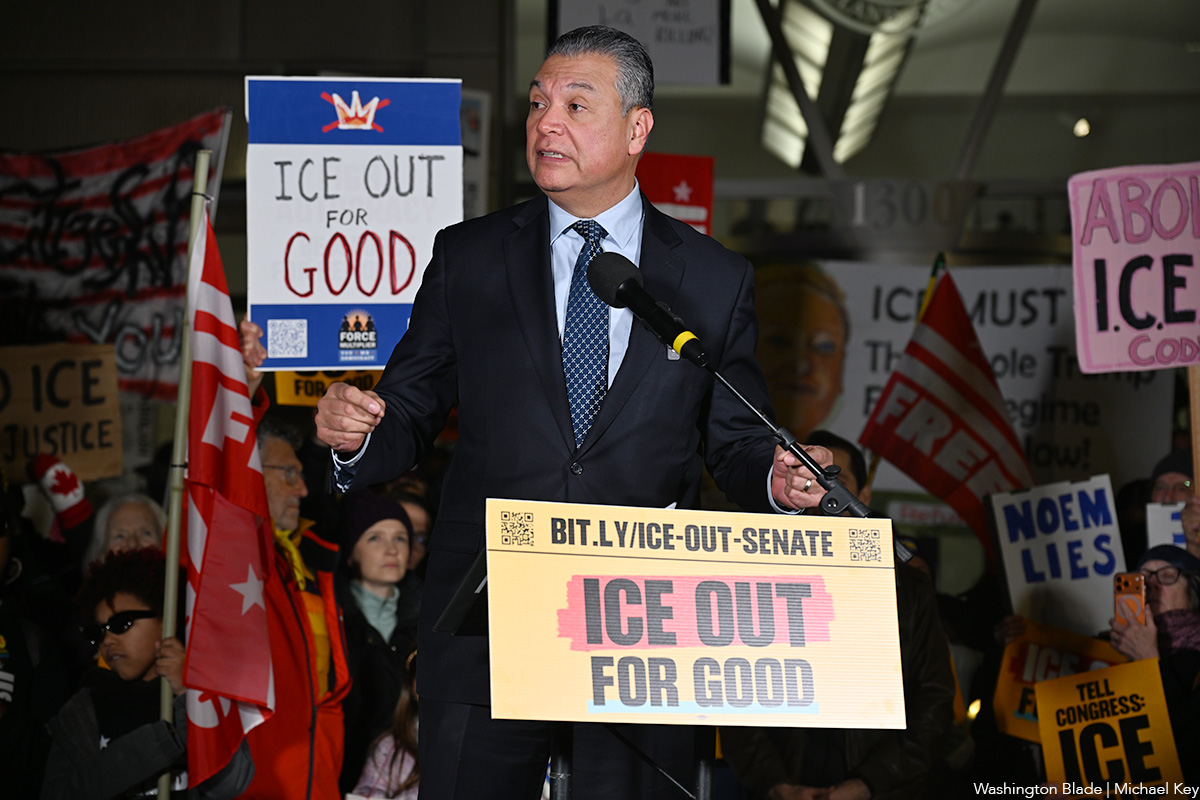
U.S. Sen. Alex Padilla (D-Md.) is among those who spoke at an “ICE Out for Good” protest that took place outside U.S. Customs and Border Protection’s headquarters in D.C. on Tuesday.
The protest took place six days after a U.S. Immigration and Customs Enforcement agent shot and killed Renee Nicole Good, a 37-year-old woman in Minneapolis.
Good left behind her wife and three children.
(Video by Michael K. Lavers)
Politics
LGBTQ Democrats say they’re ready to fight to win in 2026
Queer leaders warn Democrats not to abandon trans people
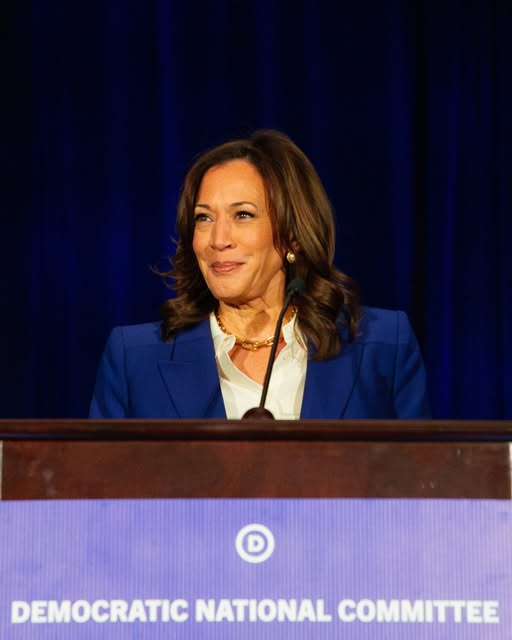
The Democratic National Committee held its annual winter meetings in Downtown Los Angeles over the weekend, and queer Democrats showed up with a clear message for the national organization: Don’t abandon queer and trans people.
Following last year’s disastrous presidential and congressional elections, many influential pundits and some powerful lawmakers called on Democrats to distance the party from unpopular positions on trans rights, in order to win swing districts by wooing more conservative voters.
But members of the DNC’s LGBTQ Caucus say that’s actually a losing strategy.
“There are still parts of our party saying we need to abandon trans people in order to win elections, which is just not provable, actually. It’s just some feelings from some old consultants in DC,” LGBTQ Caucus Chair Sean Meloy says.
Some national Democrats are already backtracking from suggestions that they walk back on trans rights.
California Governor Gavin Newsom grabbed national attention in March when he suggested that it was “deeply unfair” for trans girls to play in women’s sports. But last week, he doubled down on support for trans rights, claiming to have signed more trans-rights legislation than any governor in the country, and entering into feuds on X with Elon Musk and Nicki Minaj over his support for trans kids.
Democrats are also clearly feeling the wind in their sails recently after major election victories in Virginia and New Jersey last month, as well as victories in dozens of local and state legislative elections across the country in 2025.
“[Abigail] Spanberger in Virginia didn’t win by dodging the trans question. She won by attacking it, confronting it, and that’s how she got ahead,” says Vivian Smotherman, trans activist and at-large member of the DNC’s LGBTQ Caucus.
“Trans people are not a problem. We are a resource,” Smotherman says. “For my community, surviving into adulthood is not a guarantee, it’s an accomplishment. You don’t walk through a survival gauntlet without learning things… I’m not begging the DNC to protect my community. I’m here to remind you that we are the warriors tempered by fire, and we are fully capable of helping this party win.”
At its own meeting on Friday, the LGBTQ Caucus announced several new initiatives to ensure that queer and trans issues stay top of mind for the DNC as it gears up for the midterm elections next year.
One plan is to formalize the DNC’s Trans Advisory Board as distinct from the LGBTQ Caucus, to help introduce candidates across the country to trans people and trans issues.
“One in three people in this country know a trans person. Two-thirds of Americans don’t think they do,” Smotherman says. “So the real problem is not being trans, it’s that you don’t know us. You cannot authentically support a trans person if you’ve never met one.
“That’s why my first goal with this Trans Advisory Board is to host a monthly Meet a Trans Person webinar. Not as a spectacle, as a debate, but as a human connection, and I will be charging every state chair with asking every one of their candidates up and down the board if they know a trans person. And if that person doesn’t know a trans person, I’m gonna have that state chair put them on that webinar.”
The LGBTQ caucus is also opening up associate membership to allies who do not identify as LGBTQ, in order to broaden support and connections over queer issues.
It’s also preparing for the inevitable attacks Republicans will throw at queer candidates and supporters of LGBTQ issues.
“These attacks are going to come. You have to budget money proactively. You have to be ready to fight,” Meloy says. “There are some local party chairs who don’t want to recruit LGBTQ candidates to run because these issues might come up, right? That’s an absolutely ludicrous statement, but there are still people who need support in how to be ready and how to respond to these things that inevitably come.”
“The oldest joke is that Democrats don’t have a spine. And when they come after us, and we do not reply, we play right into that.”
Meloy also alluded to anti-LGBTQ tropes that queer people are out to harm children, and said that Democrats should be prepared to make the case that it’s actually Republicans who are protecting child abusers – for example, by suppressing the Epstein files.
“They are weak on this issue. Take the fight, empower your parties to say, ‘These people have nothing to stand on,’” Meloy says.
Politics
George Santos speaks out on prison, Trump pardon, and more
Not interested in political comeback: ‘I made so many poor choices’

It has been just over two years since George Santos — the disgraced politician who once represented New York’s Third District — was expelled from Congress. Now, Santos is breaking his silence about his expulsion, imprisonment, subsequent pardon, what he believes he did wrong, and allegations regarding immigration fraud.
In 2022, Santos was elected to represent the Long Island communities of North Hempstead, Glen Cove, and Oyster Bay, one of the wealthiest congressional districts in the United States. This week, he sat in the lobby of the Hyatt Capitol Hill, just blocks from his former office in the Cannon House Office Building, to speak with the Washington Blade about how he became the center of one of the most outrageous political scandals in modern U.S. history. Despite the media scrutiny surrounding his lies, criminal convictions, and eventual pardon by President Donald Trump, Santos appeared relaxed during the interview, speaking freely about his experiences, admissions, and grievances.
Scope of Santos’s misconduct
Many journalists have struggled to verify George Santos’s personal history and professional resume. Numerous claims he made during his campaigns have been debunked or walked back, particularly regarding his personal and professional history since 2020.
Santos gained media attention for claiming Jewish heritage despite being raised Catholic and identifying as Catholic. He said his maternal grandfather grew up Jewish, converted to Catholicism before the Holocaust, and raised his children Catholic. Investigations, however, show his maternal grandparents were born in Brazil, not Ukraine or Belgium. Santos described himself variously as “Jew-ish,” “half Jewish,” a non-observant Jew, a “proud American Jew,” and a “Latino Jew.”
He also misrepresented his mother’s professional history, claiming she was “the first female executive at a major financial institution.” Records, including her 2003 visa application, show she had not been in the U.S. since 1999 and listed her occupation as a domestic worker.
Santos further fabricated his educational history, claiming a bachelor’s degree in finance and economics from Baruch College, where he said he graduated near the top of his class. Investigations revealed he never graduated. He also falsely claimed an MBA from New York University on official campaign documents — a misrepresentation that later became grounds for his expulsion. Santos later blamed the lies on a local Republican Party staffer.
His professional claims were also fraudulent. Santos called himself a “seasoned Wall Street financier and investor” and claimed to have worked for Citigroup and Goldman Sachs. Both companies reported no record of his employment. When pressed, Santos admitted he had used a “poor choice of words,” eventually describing his experience as “limited partnerships.” He also falsely claimed to have lost four employees in the 2016 Pulse nightclub shooting in Orlando; no victims had any connection to companies listed in his biography.
Santos misrepresented his residences during his 2020 campaign. He listed an Elmhurst, Queens, address outside the district he sought to represent, later moving with his partner to a Whitestone rowhouse. He was registered to vote at the Whitestone address but did not live there.
When asked about his lies, Santos told the Blade he wishes he did everything differently.
“Everything, everything, everything,” Santos told the Blade. “I made so many poor choices that I think it would be redundant to not say everything.”
He did not fully take responsibility, describing the scandals as a mix of personal ambition and what he called a “sensational political assassination.”
“Ambition is a toxic trait, and unfortunately, I was consumed by that. I forewent everyone else’s [considerations]… I had no consideration for anything around me other than myself, and that’s awful,” he added.
In addition to personal history fabrications, Santos made numerous false claims the Department of Justice later treated as campaign finance fraud. He solicited donations through a fake political entity, diverted funds into an LLC he controlled, and disguised personal expenditures as legitimate political expenses, using donations for luxury purchases.
Santos denied wrongdoing, stating, “I didn’t steal people’s credit cards… I didn’t go shopping at Hermes and Onlyfans. It’s not true either.”
He defended some purchases as campaign-related, singling out House Ethics Committee Chairman Michael Guest.
“The only two luxury brands that you’ll see of purchases in my campaign were Ferragamo and Tiffany. [I got] Ferragamo for the [male members of the] Republican steering committee when I was lobbying for my seat committee and three Tiffany pens for the females … That’s where those are legal expenses. They’re very legal.”
The House Ethics Committee found “substantial evidence” of lawbreaking, stating Santos “fraudulently exploited every aspect of his House candidacy,” using campaign funds for luxury shopping, cosmetic procedures, travel, and rent.
“I had a choice to not straw donate to my campaign, and I chose to, yeah, that was a poor choice,” Santos admitted. “Of course, I’m guilty for that. Was I forthcoming in the GOP with the party? No, I was not. I was very dishonest with the GOP, and for that I regret, and I also regret that the GOP in New York created an environment that made somebody like me feel it was needed to do that. But I regret not being forthcoming and honest about it.”
Santos also collected pandemic unemployment payments of approximately $24,000 while employed.
He was charged with multiple federal offenses, including conspiracy to commit offenses against the United States, wire fraud, making materially false statements to the FEC, falsifying records, aggravated identity theft, access device fraud, money laundering, and theft of public funds. Santos pleaded guilty to wire fraud and aggravated identity theft and was sentenced to 87 months in prison in April 2025, ordered to pay hundreds of thousands in restitution and forfeiture. He was released from the Federal Correctional Institution in Fairton, N. J., following Trump’s pardon in October.
Immigration fraud allegations

In addition to the professional and personal claims Santos has made that have been proven false, he also addressed allegations of immigration fraud raised by the Washington Blade. A source familiar with Santos’s history with U.S. immigration proceedings described several alarming allegations, most notably a reportedly fraudulent marriage to his former wife, Uadla Viera, to help her obtain U.S. immigration status. Santos has adamantly denied wrongdoing.
According to the source, who spoke to the Blade on condition of anonymity, Santos married Viera in a civil ceremony in Manhattan in 2012, despite neither living in the city. There are no known photos, announcements, or records of a wedding celebration, engagement, bridal party, shower, or honeymoon. This unusual lack of documentation stands out for Santos, whose life and actions are typically geared toward media attention.
While the source questioned the motive behind the marriage, Santos insisted it was legal and not done for any nefarious purpose.
“I married a person who was legally in this country, and all in all, what I did was kind of skip the line for her. And we were married, and there was no financial benefit [for me]. We were married. We had bills together. There’s no proof or evidence of a financial benefit other than jaded people again, anonymously, lying saying ‘He got paid. He offered me money.’ First of all, I don’t even have the wherewithal for that. Second of all, we went through a very rigorous — fucking rigorous — immigration litmus test, house interviews, multiple layers of interviews, a consummate marriage that was very obvious for anybody who was around us, and then I ended up cheating for now, obvious reasons.”
In 2013, the source said Santos dated Leandro Bis, a Brazilian tourist, while still married to Vieira. Santos denies this, framing the period as tumultuous and asserting that he was merely helping someone in need who now falsely alleges more. Bis told ABC News in a 2023 interview that Santos had “promised the world” to him while they dated.
“I’ve never dated a Leandro,” Santos told the Blade. “I can’t believe that six months of my life are common stories in the New York Times. This lunatic is going on TV and putting himself out there…I look so much better than him, and I’m much older than him. I mean life does numbers on people, because hate is a virus.”
The source further recounted Santos’s interactions with Greg Morey-Parker, a former roommate of Santos’s who told CNN that he was suspicious of Santos’s academic resume and stories of family wealth.
“Greg Morey-Parker is not a boyfriend– nowhere near a boyfriend,” Santos told the Blade. “He was actually a homeless Starbucks barista that I felt bad for. Let him crash in my living room. … He accused me of stealing his Burberry scarf. You’re homeless and you have a Burberry scarf? Bro, make up your fucking mind.”
In 2014, Santos met Pedro Vilarva, 18, on Tinder and dated him for a year while still married to Viera. According to the source, the trio socialized frequently: Santos and Vilarva with other gay men, Viera with heterosexuals. That same year, Santos filed a family-based immigration petition for Viera, who was granted conditional permanent residency. Santos publicly celebrated his engagement to Vilarva in a Facebook post at La Bonne Soupe, a Manhattan restaurant, though the relationship eventually ended. That Facebook post has since been deleted.
Santos maintains he was honest with both immigration authorities and his spouse.
“I was honest with immigration authorities, 100% above board. I was honest with my spouse, as far as my relationship with him and with my ex-wife, so much I’m the one who told her, I’m sorry we can’t do this anymore. I’m seeing Pedro. And she knew Pedro, it was a shit show. Okay? I’m gonna leave it at that, out of respect to both her and Pedro … I cheated on my first wife, and that was a whole story on its own.”
Later in 2014, Santos met Morey-Parker, who told the Daily Beast that Santos advised him to marry an immigrant woman from Brazil to make money. Santos denied that claim to the Blade.
“That is Gregory again making more shit up and there’s no proof or evidence or anything that you can point to,” Santos said.
Viera became a permanent resident in 2017, according to previous media reports, and in 2018 gave birth to a daughter. Santos did not claim paternity or seek custody. Santos and Viera were granted an uncontested divorce in 2019. Viera became a U.S. citizen in 2022 and purchased a $750,000 home in New Jersey, according to the Blade’s source and to the official deed of the property.
Santos did not mention that he had been married or divorced during his congressional campaigns until an internal vulnerability study commissioned by the campaign identified it as a potential issue for voters.
Santos downplayed all of this, saying it was a running joke among his staff. “I would be a joke. I would allude to it [and say] ‘Ladies, look, I love you guys, but there’s a reason that I don’t date women anymore, and I’m divorced from my first wife.’ It was like a running joke, making light of it and self-deprecating humor, which is my favorite kind of humor.”
He claimed that the New York Times story was the reason he became more sensitive with posts related to his ex-wife.
“The reason it’s not [visible] today is because I pulled it all off because of privacy issues. It was all archived for my Instagram, but if you had access to my Instagram prior to the New York Times story, you would see I never deleted my pictures with her…They were all over my Instagram, going to the beach, like everything. It’s like our entire life was documented together.”
On Trump, politics, and public office
Santos was tight lipped when the Blade questioned him about his conversations with President Trump.
“You never, ever share a lick of a word you exchange with the sitting president of the United States, no matter who that person is… I’ve seen it backfire for people who did it with Biden, with Trump, with Obama. I’m not about to make that mistake. Yeah, my conversations with the president are private.”
He did say that he was humbled by Trump’s pardon but regrets ever entering politics.
“I had such a good life, and to have to be at the place I am today is indicative of, you know, politics is really for the elites…I’m so uninterested in politics these days…I want to get involved in policy change, but not politicking.”
He said he is not interested in a position in the Trump administration.
“I would respectfully decline [any government job], I would say thank you from the bottom of my heart, and say ‘I’m probably not best suited for a job in government.’ I want nothing to do with the government or public office.”
Trans and LGBTQ issues

Santos also spoke on his experience as both a member of the LGBTQ community and a Republican legislator. Most notably, he doesn’t think there is any barrier for gay people to join the Republican Party, citing his ascent into Republican leadership as an example.
He defended his record as a gay Republican, noting the continued election and reelection of LGBTQ members of Congress and emphasizing that he disproved stereotypes about Republicans.
“There’s no bigotry in the Republican Party. It’s a matter of how you present yourself…I’m not saying there’s no anti-gay sentiment, I’m pretty sure there is, but I never experienced it.”
He continued, explaining how far-right figures gaining prominence within Republican circles sets off some tension.
“I know it exists… I mean Nick Fuentes exists, right? His followers go on my social media, and either call me a Jew or a homo all day long. But I’m proud of it. I’m proud that I was the first who didn’t conceal the fact that he’s gay, and still got elected by a constituency of Republicans in a landslide victory.”
It is important to note that Santos is the first openly LGBTQ non-incumbent Republican to be elected to Congress, not the first openly LGBTQ Republican to win an office. Santos won his seat with 53% of his district’s vote while his opponent, Robert Zimmerman, got 46%.
Santos spoke on his experience as a gay man, echoing other LGB Republicans who have distanced themselves from transgender rights.
“This is very controversial for me, but I don’t loop my issues in with the trans community issues. I’m a gay man. I’m gender conforming. I’m he/him/sir.”
He continued, saying all he can speak on is his experience as a gay man, which doesn’t inherently lend him to being a champion for transgender rights, unlike many other LGB elected officials have done.
“I’ve never walked in the shoes of a trans person, so I can’t speak for them.” Santos framed his stance on gender-affirming care carefully: “I believe those people deserve the right to treatment, and that’s fair. I don’t believe in a mass agenda of pushing children towards that. I think we need to have a sensible conversation of, let’s allow kids to get to a certain age, right? Let’s allow adults to make those decisions, not children…for permanent decisions like hormone blockers and puberty blockers…that should be with adults.”
This is despite general medical consensus that views gender-affirming care as medically necessary, appropriate, and potentially life-saving for trans youth. The American Medical Association, the largest medical association in the country, opposes state laws that interfere with or ban gender-affirming care, calling such actions harmful and contrary to medical evidence.
Prison experience
Santos also spoke explicitly about what he says are dehumanizing conditions at FCI Fairton, something that has given him a new passion following his release from the facility.
“It’s punitive and dehumanizing,” he said when describing the situation he was in.
“Black mold bubbling all over the ceiling. Rat infestations… Listeria and ringworm outbreaks. Expired food… Underwear with skid marks… either wear that or don’t wear underwear.”
He continued, emphasizing the dehumanizing treatment he says he received, and hoping it will lead to prison reform.
“Solitary confinement for 41 days. Three showers a week. One 15-minute phone call every 30 days. [The warden] an absolute vicious human being. … We need to rehabilitate people. Just make it humane.”
Santos hinted at a future in media and activism, particularly related to prison reform, signaling that while he has stepped away from public office, he may still seek to influence policy and public discourse.
Despite his dramatic fall from political grace, Santos remains unapologetically in the public eye. From allegations of fraud to his prison experience and ongoing controversies, he presents a portrait of a man both shaped by — and defiant of — the consequences of his actions. Whether the public views him as a cautionary tale, a redeemed figure, or something in between, Santos’s story continues to provoke debate about accountability, ambition, and the limits of political power in America.
Politics
Honoring Stonewall: A conversation with Senator Toni Atkins on the past, present, and future of Pride
As we commemorate the 50th anniversary of the Stonewall Uprising, the Stonewall Democratic Club honors leaders like Senator Toni Atkins, whose lifelong commitment to equality and public service reflects the enduring legacy and ongoing promise of Stonewall
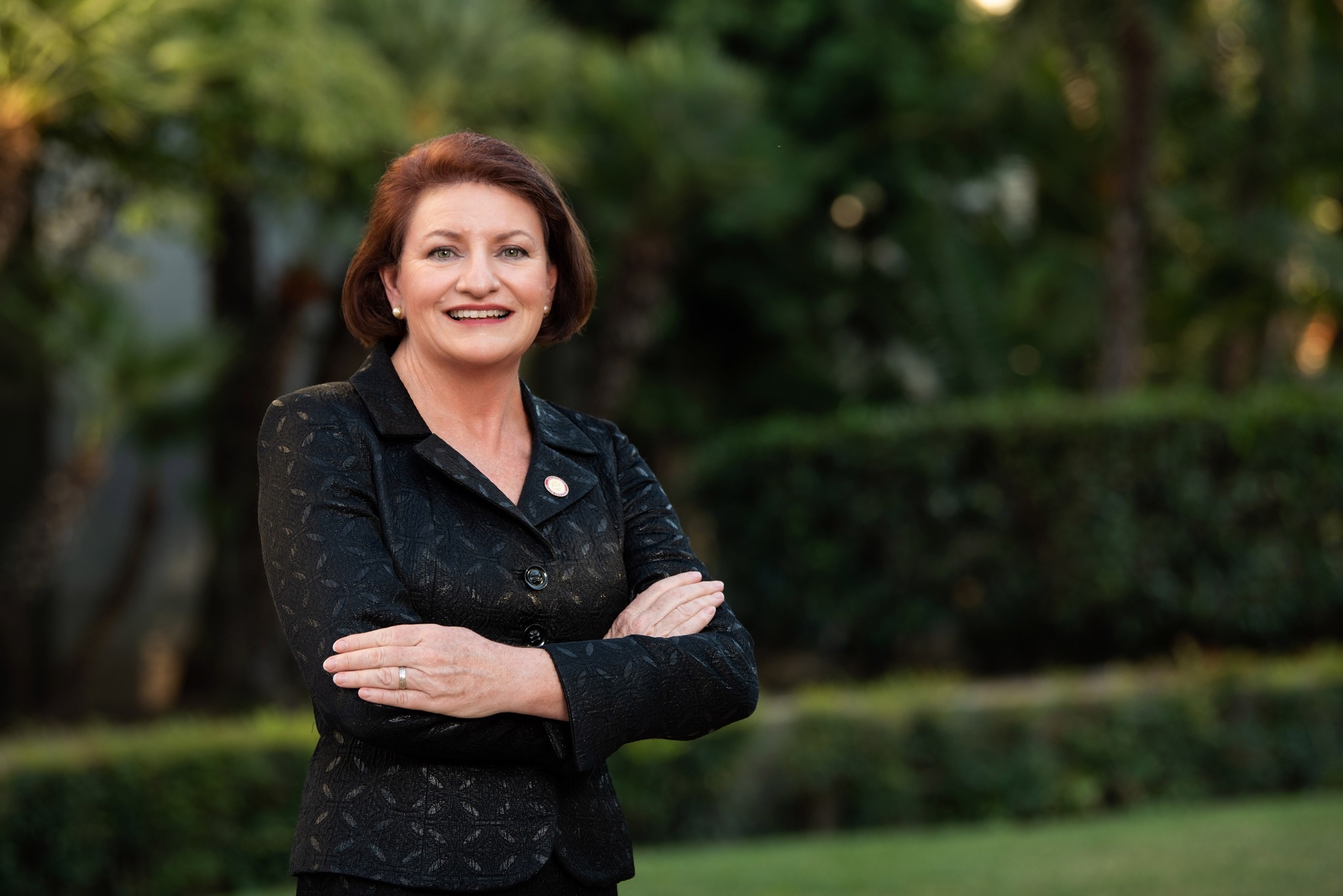
As we rapidly approach the 50th anniversary of the Stonewall Uprising – an inarguably paramount moment that fueled a national movement for LGBTQ civil rights – the Stonewall Democratic Club continues to carry into the future the spirit of that rebellion through advocacy and political action. This milestone also provides our community with an opportunity to reflect on the leaders who have carried that spirit forward, including Senator Toni Atkins, whose decades of public service have been shaped by a resounding commitment to equality and representation of marginalized communities. Her journey, from growing up in rural poverty to becoming one of California’s most impactful legislative leaders, embodies the progress made since Stonewall and the work that still lies ahead for us.
As our community and our country approach the 50th anniversary of the Stonewall Uprising, how does that milestone resonate with you personally, politically, or otherwise?
Personally, I came out at age 17 in a very conservative rural community. I didn’t see other people like me, and I didn’t believe society was built for someone like me. So I am simply grateful to have been part of our movement for civil rights for my LGBTQ+ community. Politically, we have made tremendous gains, and we now face a very intentional and serious backlash. Our work and political engagement are more important than ever.
In your opinion, what do you believe was the most significant achievement that came from Stonewall? What unfinished business do we still have to work on?
The most significant achievement was visibility – seeing our collective strength for the first time.
Today, we must fight to regain the ability to serve openly in the military, protect marriage equality, and hold our hard-won ground. We must continue educating allies and families about the lives and experiences of nonbinary and transgender community members. In many ways, we are refighting some of the same battles.
We also have to work in partnership with other marginalized communities on issues beyond civil rights – income inequality, access to healthcare (including gender-affirming care), educational opportunities, and affordability. The struggle for justice is interconnected.
How do you view the connection between the activism of that time in our country and the modern policy work of the California Legislature?
Activism and organizing were essential then, and they remain essential today. We still have to strategize, organize, and take action. That hasn’t changed.
You have had a long and devoted career in public service in California. What first inspired you to get into politics? How have your own experiences as a queer woman shaped your journey along the way?
Our stories – every one of them – matter. My history has shaped every policy issue I’ve worked on. I grew up in a working-poor family. My parents, three siblings, and I lived in a four-room house with no indoor plumbing. We carried water from a nearby spring to drink, cook with, and bathe. We lacked consistent healthcare. My father was a lead miner; my mother worked as a seamstress in a factory.
Coming out as a lesbian at a young age was another defining part of my story. All of this influenced my work on housing, healthcare, LGBTQ rights, the environment, and labor protections. I saw firsthand how the mines destroyed the environment, how little safety, benefits, or protections my father had, and how families like mine struggled. Much of my political work has been about empowerment – for myself, my family, and others facing similar obstacles.
I entered politics by helping my mentor, Christine Kehoe, get elected to the San Diego City Council in 1993 – the first openly LGBTQ candidate elected to that body. Working with her at City Hall showed me the difference we could make when we had a seat at the table. That was my motivation – not only for the LGBTQ community but for all marginalized communities, working families, and women. I am forever grateful to Chris for giving me a chance to serve.
What moments in your legislative or leadership roles shine brightest in your mind as being most impactful to you?
So many- the Gender Recognition Act, Proposition 1, which I authored to enshrine abortion and contraception into the California Constitution, and Proposition 3, which did the same for marriage equality. The Earned Income Tax Credit (EITC) for working individuals and families. Creating a permanent source of funds for affordable housing. The California Dream For All downpayment assistance loan for people to buy their first home. Support for funding Prep and for community clinics and Planned Parenthood. Increased funding for childcare for working families and increased paid family leave! So many issues and so much good can be done through public policy and budget actions. That is the importance of the political work of the LGBTQ community and our allies!
As the former Speaker and as President ProTem – I have had the ability not just to sit at that table but to actually set the agenda. I’m grateful and honored for the opportunity.
Over the years you have spent in politics, how has your sense of “why I do this work” evolved, particularly in relation to our queer community and broader social justice aims?
I have seen how strategy, organizing, fundraising, and activism empower us to influence policy and budget decisions rooted in shared values. Relationships also matter – the ones we build, the conversations we have, and the listening we do. Those connections make us better and more effective.
Decades ago, we relied heavily on allies because we didn’t have seats at the table ourselves. We must never forget that. There is no shortcut for the crucial, ongoing conversations needed to continue advancing equality.
How would you describe the state of queer rights and representation in California today?
California’s values – in the public and in the Legislature – largely reflect strong support for our community. Still, especially regarding trans rights, we must keep engaging allies and others about who we are as nonbinary and transgender individuals. That is the next frontier of our civil-rights journey.
And our LGBTQ Caucus has never been larger or more effective. Many members, as I once was, are now in positions of real power and influence, moving forward policies that support our community.
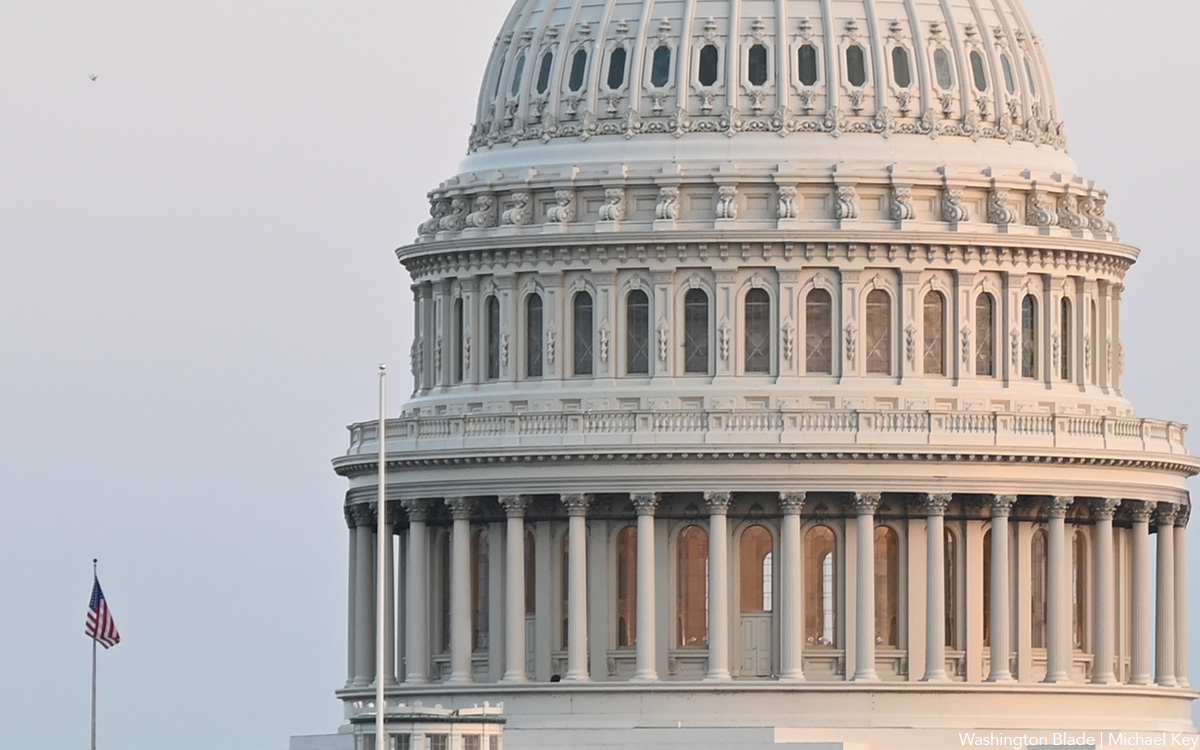
President Donald Trump on Wednesday signed a bill that reopens the federal government.
Six Democrats — U.S. Reps. Jared Golden (D-Maine), Marie Gluesenkamp Perez (D-Wash.), Adam Gray (D-Calif.), Don Davis (D-N.C.), Henry Cuellar (D-Texas), and Tom Suozzi (D-N.Y.) — voted for the funding bill that passed in the U.S. House of Representatives. Two Republicans — Thomas Massie (R-Ky.) and Greg Steube (R-Fla.) — opposed it.
The 43-day shutdown is over after eight Democratic senators gave in to Republicans’ push to roll back parts of the Affordable Care Act. According to CNBC, the average ACA recipient could see premiums more than double in 2026, and about one in 10 enrollees could lose a premium tax credit altogether.
These eight senators — U.S. Sens. Catherine Cortez Masto (D-Nev.), Dick Durbin (D-Ill.), John Fetterman (D-Pa.), Maggie Hassan (D-N.H.), Tim Kaine (D-Va.), Angus King (I-Maine), Jacky Rosen (D-Nev.), and Jeanne Shaheen (D-N.H.) — sided with Republicans to pass legislation reopening the government for a set number of days. They emphasized that their primary goal was to reopen the government, with discussions about ACA tax credits to continue afterward.
None of the senators who supported the deal are up for reelection.
King said on Sunday night that the Senate deal represents “a victory” because it gives Democrats “an opportunity” to extend ACA tax credits, now that Senate Republican leaders have agreed to hold a vote on the issue in December. (The House has not made any similar commitment.)
The government’s reopening also brought a win for Democrats’ other priorities: Arizona Congresswoman Adelita Grijalva was sworn in after a record-breaking delay in swearing in, eventually becoming the 218th signer of a discharge petition to release the Epstein files.
This story is being updated as more information becomes available.

Former Vice President Dick Cheney died of complications from pneumonia and cardio and vascular disease, according to a family statement released Tuesday morning. He was 84.
Cheney served as vice president under President George W. Bush for eight years and previously as defense secretary under President George H.W. Bush. He also served as a House member from Wyoming and as White House chief of staff for President Gerald Ford.
“Dick Cheney was a great and good man who taught his children and grandchildren to love our country, and to live lives of courage, honor, love, kindness, and fly fishing,” his family said in a statement. “We are grateful beyond measure for all Dick Cheney did for our country. And we are blessed beyond measure to have loved and been loved by this noble giant of a man.”
Cheney had a complicated history on LGBTQ+ issues; he and wife Lynne had two daughters, Liz Cheney and Mary Cheney, who’s a lesbian. Mary Cheney was criticized by LGBTQ+ advocates for not joining the fight against President George W. Bush’s push for a constitutional amendment banning gay marriage. She later resumed support for LGBTQ+ issues in 2009, including same-sex marriage, after her father left office in 2009. She married her partner since 1992, Heather Poe, in 2012.
In 2010, after leaving office, Cheney predicted “Don’t Ask, Don’t Tell” would “be changed” and expressed support for reconsideration of the law banning open military service.
In 2013, the Cheney family’s disagreements over marriage equality spilled into the public eye after Liz Cheney announced her opposition to same-sex couples legally marrying. Mary Cheney took to Facebook to rebuke her sister: “Liz – this isn’t just an issue on which we disagree – you’re just wrong – and on the wrong side of history.” Dick and Lynne Cheney were supporters of marriage equality by 2013. Liz Cheney eventually came around years later.
Cheney, a neo-con, was often criticized for his handling of the Iraq war. He was considered one of the most powerful and domineering vice presidents of the modern era. He disappeared from public life for years but re-emerged to help Liz Cheney in her House re-election bid after she clashed with President Trump. Dick Cheney assailed Trump in a campaign video and later Liz announced that her father would vote for Kamala Harris in the 2024 presidential election.
State Department
State Department’s 2024 human rights report could jeopardize LGBTQ+ asylum cases
‘Targeted and malicious act’ will ‘directly endanger lives’
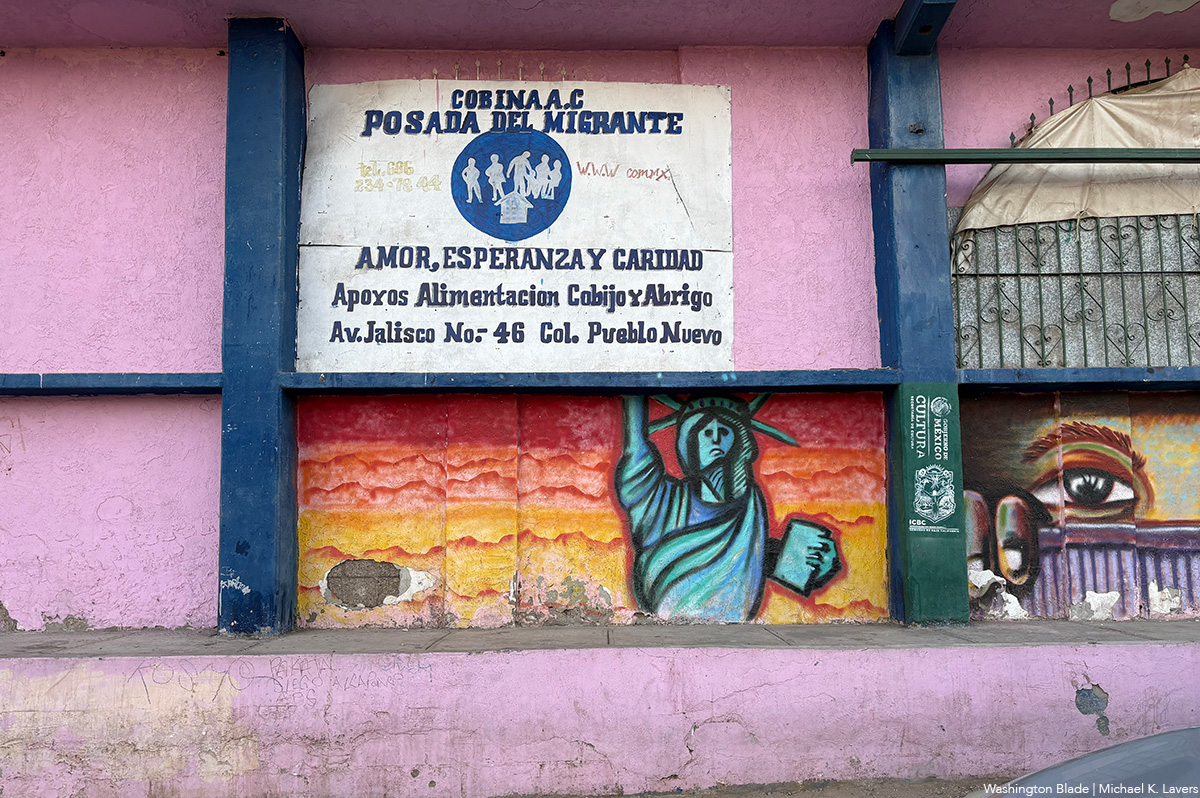
Advocacy groups say the State Department’s 2024 human rights report that “erased” LGBTQ+ people will jeopardize the cases of those who are seeking asylum in the U.S.
Immigration Equality notes the report “serve as key evidence for asylum seekers, attorneys, judges, and advocates who rely on them to assess human rights conditions and protection claims worldwide.”
The 2024 report the State Department released on Aug. 12 did not include LGBTQ+-specific references. Immigration Equality Director of Law and Policy Bridget Crawford in a statement said country-specific reports within the larger report “should be accurate, fact-based, and reflect the lived reality of LGBTQ people — not ignore and actively hide it.”
“When adjudicators see less information in these reports than in prior years, they may wrongly assume conditions have improved,” said Crawford. “In truth, the absence of reporting is a purely political move, not based in fact or reality.”
Organization for Refuge, Asylum and Migration Executive Director Steve Roth in a statement condemned the Trump-Vance administration’s “deliberate erasure of LGBTIQ communities from the 2024 human rights report — an unprecedented move that violates international standards.”
“This is a targeted and malicious act that will directly endanger lives,” he said.
Roth, like Immigration Equality, noted courts “around the world rely on these reports to evaluate asylum claims.”
“Stripping out documentation of LGBTIQ persecution removes a vital tool in assessing claims for protection, jeopardizing the ability of LGBTIQ asylum seekers to access safety,” said Roth.
Congress requires the State Department to release a human rights report each year.
The State Department usually releases them in the spring, as opposed to August. Then-State Department spokesperson Tammy Bruce, who president Donald Trump has nominated to become deputy representative at the U.N., during her last press briefing on Aug. 12 defended the delay and the report itself.
“We weren’t going to release something compiled and written by the previous administration,” said Bruce. “It needed to change based on the point of view and the vision of the Trump administration, and so those changes were made.”
Asylum courts ‘will have less credible data to rely on’
Jessica Stern, the former special U.S. envoy for the promotion of LGBTQ+ and intersex rights under the Biden-Harris administration, co-founded the Alliance for Diplomacy and Justice with several other former State Department officials.
The Alliance for Diplomacy and Justice in response to the report said the U.S. has “betrayed the trust of human rights defenders who risked their safety to share the truth” and added “some (of them) are now less safe.”
“Asylum courts in the U.S. and globally will have less credible data to rely on,” said the group.
Human Rights Watch echoed the Alliance for Diplomacy and Justice.
“The human rights report has been used in U.S. asylum court cases to show that an asylum seeker could not be returned to a country where similarly situated people were being persecuted,” said Human Rights Watch in response to the 2024 report. “That essential resource for keeping people safe is not only no longer reliable or helpful, but in some cases could put people at risk by denying abuses in places where the United States or other countries intend to deport asylum seekers and immigrants.”
State Department
LGBTQ people ‘erased’ from State Department’s 2024 human rights report
Document released Tuesday after months of delay

Advocacy groups on Tuesday sharply criticized the removal LGBTQ-specific references from the State Department’s 2024 human rights report.
The report, which the State Department released on Tuesday, does not reference Uganda’s Anti-Homosexuality Law and the impact it has had on the country’s LGBTQ community since President Yoweri Museveni signed it in 2023. The report, however, does note Ugandan government officials “reportedly committed acts of sexual violence.”
“NGOs reported police medical staff subjected at least 15 persons to forced anal examinations following their arrests,” it reads. “Opposition protesters stated security forces used or threatened to use forced anal examinations during interrogations.”
Uganda is among the dozens of countries in which consensual same-sex sexual relations remain criminalized. Authorities in the African country often use so-called anal tests to determine whether someone has engaged in homosexuality.
The report does not mention that Brazil has the highest number of reported murders of transgender people in the world. It does, however, note the President Luiz Inácio Lula da Silva in 2024 “undermined democratic debate by restricting access to online content deemed to ‘undermine democracy,’ disproportionately suppressing the speech of supporters of former President Jair Bolsonaro as well as journalists and elected politicians, often in secret proceedings that lacked due process guarantees.”
The report says there “were no credible reports of significant human rights abuses” in Hungary in 2024, even though Prime Minister Viktor Orbán’s government continued its anti-LGBTQ rights crackdown. The report does note Russian authorities last year “invoked a law prohibiting the distribution of ‘propaganda on nontraditional sexual relations’ to children.”
The State Department’s 2023 human rights report specifically notes a Russian law “prohibited gender transition procedures and gender-affirming care … and authorities used laws prohibiting the promotion of ‘non-traditional sexual relations’ to justify the arbitrary arrest of LGBTQI+ persons.” The 2023 report also cites reports that “state actors committed violence against LGBTQI+ individuals based on their sexual orientation or gender identity, particularly in Chechnya” and “government agents attacked, harassed, and threatened LGBTQI+ activists.”
“There were instances of non-state actor violence targeting LGBTQI+ persons and of police often failing to respond adequately to such incidents,” it adds.
The 2024 report does not mention Thai lawmakers last year approved a bill that extended marriage rights to same-sex couples. Gays and lesbians began to legally marry in the country in January.
Jessica Stern, the former special U.S. envoy for the promotion of LGBTQ and intersex rights under the Biden-Harris administration who co-founded the Alliance for Diplomacy and Justice, during a conference call with reporters on Tuesday said she and her colleagues “expected (the report) to be bad.”
“When we saw what the administration released, the truth is we were shocked and horrified,” said Stern.
Stern added the Trump-Vance administration “has erased or watered-down entire categories of abuse against people of African descent, indigenous people, Roma people, members of other marginalized racial and ethnic communities, workers, women and girls, and LGBTQI+ people.”
“It is deliberate erasure,” said Stern.
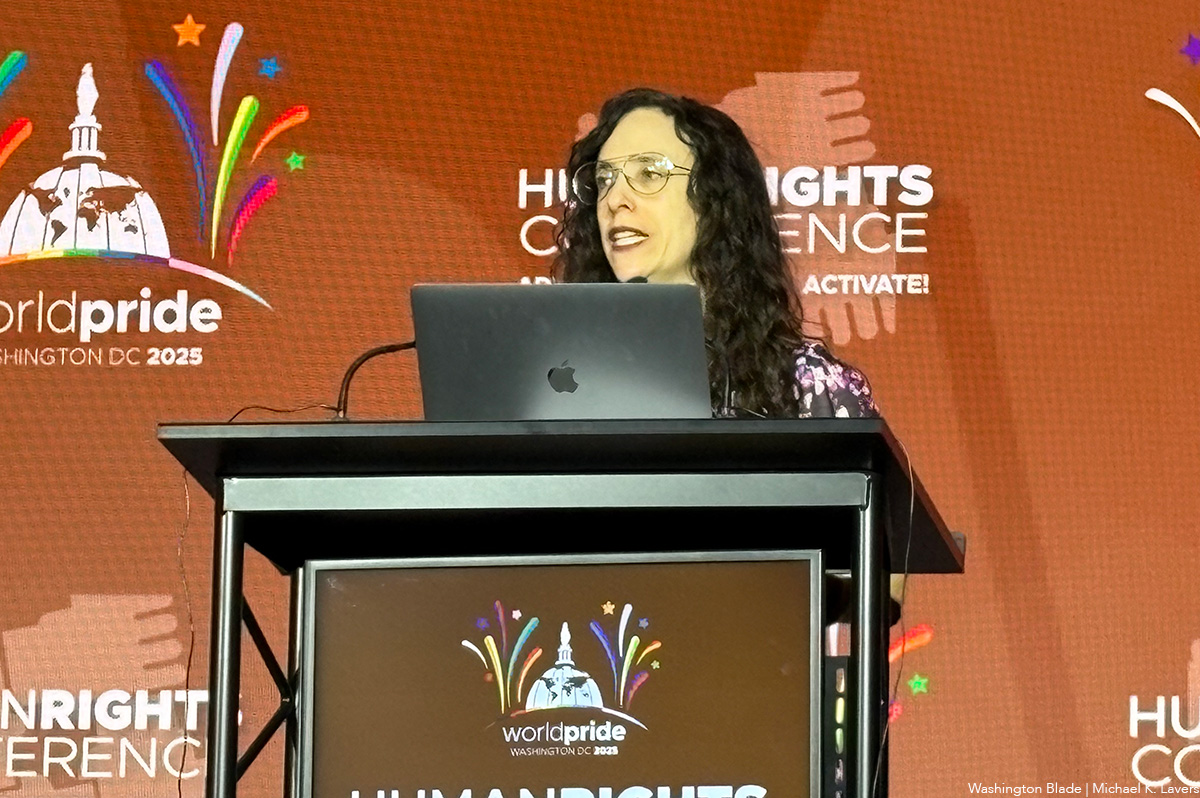
The Council for Global Equality in a statement condemned “the drastic restructuring and glaring omission of violence and abuse targeting lesbian, gay, bisexual, transgender, queer, and intersex (LGBTQI+) persons in the U.S.”
“We denounce the Trump administration’s efforts to politicize the State Department’s annual human rights reports by stripping longstanding references to human rights abuses targeting LGBTQI+ and other marginalized groups,” said Mark Bromley, the group’s co-chair.
Gay U.S. Rep. Mark Takano (D-Calif.), who chairs the Congressional Equality Caucus, echoed Bromley and Stern.
“Omitting the persecution of LGBTQI+ people from the human rights reports doesn’t erase the abuse, violence, and criminalization our community is facing around the world — it condones it,” said Takano in a statement.
“Erasing our community from these reports makes it that much harder for human rights advocates, the press, and the American people to be aware of the abuses LGBTQI+ people are facing worldwide,” he added.
Congress requires the State Department to release a human rights report each year. Foggy Bottom usually releases it in the spring.
Politico in March reported the Trump-Vance administration planned to cut “sections about the rights of women, the disabled, the LGBTQ+ community, and more” from the human rights report. State Department spokesperson Tammy Bruce, who President Donald Trump has nominated to become deputy representative at the U.N., on Tuesday during her last press briefing defended the report and the delay in releasing it.
“We weren’t going to release something compiled and written by the previous administration,” said Bruce. “It needed to change based on the point of view and the vision of the Trump administration, and so those changes were made.”
“It certainly promotes, as does our work, a respect for human rights around the globe,” added the former Fox News contributor who has described herself as a “gay woman.”
The Council for Global Equality and Democracy Forward has filed a Freedom of Information Act lawsuit. A press release notes it is “seeking the release of additional information … including any instructions provided by political appointees to strip references to abuses against LGBTQI+ persons from the reports.”
“The reports make LGBTQI+ persons and other minorities invisible and, in so doing, they undermine the human rights landscape that protects all of us,” said Bromley.
“Erasing our community from these reports makes it that much harder for human rights advocates, the press, and the American people to be aware of the abuses LGBTQI+ people are facing worldwide,” added Takano. “Failing to rectify this censorship will have real — and potentially deadly — consequences for LGBTQI+ people, including both for those who travel abroad from the U.S. and for LGBTQI+ people in countries whose leadership no longer need to worry about consequences for their human rights abuses. The State Department must reverse course and restore the LGBTQI+ section to these reports.”
A State Department spokesperson told the Washington Blade the “information included in the 2024 reports has been restructured and streamlined for better utility and accessibility, and to be more responsive to the legislative mandate for the (human rights report.)”
“The result directly addresses the reporting requirements as laid out in statute as well as being more streamlined, objective, universal, and accessible to the American public,” said the spokesperson.
The spokesperson did not comment on the FOIA lawsuit the Council for Global Equality and Democracy Forward has filed.

U.S. Citizenship and Immigration Services on Monday announced it will ensure “male aliens seeking immigration benefits aren’t coming to the U.S. to participate in women’s sports.”
The announcement notes USCIS “has clarified eligibility for certain visa categories: O-1A aliens of extraordinary ability, E11 aliens of extraordinary ability, E21 aliens of exceptional ability, and for national interest waivers (NIWs), to guarantee an even playing field for all women’s athletics in the United States.” The new policy comes roughly six months after President Donald Trump issued an executive order that bans transgender women and girls from female sports teams in the U.S.
“Men do not belong in women’s sports. USCIS is closing the loophole for foreign male athletes whose only chance at winning elite sports is to change their gender identity and leverage their biological advantages against women,” said USCIS spokesperson Matthew Tragesser. “It’s a matter of safety, fairness, respect, and truth that only female athletes receive a visa to come to the U.S. to participate in women’s sports.”
“The Trump administration is standing up for the silent majority who’ve long been victims of leftist policies that defy common sense,” added Tragesser.
USCIS in April announced it will only recognize “two biological sexes, male and female.” Trump shortly after he took office for a second time on Jan. 20 signed the “Defending Women from Gender Ideology Extremism and Restoring Biological Truth to the Federal Government” executive order.
The 2028 Summer Olympics will take place in Los Angeles.
The U.S. Olympic and Paralympic Committee last month banned trans women from competing in women’s sporting events.
The Guardian earlier this year reported the State Department ordered consular officials “to deny visas to transgender athletes attempting to come to the U.S. for sports competitions, and to issue permanent visa bans against those who are deemed to misrepresent their birth sex on visa applications.”
Germany and Denmark are among the countries that have issued travel advisory for trans and nonbinary people who are planning to visit the U.S. The warnings specifically note the Trump-Vance administration has banned the State Department from issuing passports with “X” gender markers.
“This policy update clarifies that USCIS considers the fact that a male athlete has been competing against women as a negative factor in determining whether the alien is among the small percentage at the very top of the field,” reads the USCIS announcement. “USCIS does not consider a male athlete who has gained acclaim in men’s sports and seeks to compete in women’s sports in the United States to be seeking to continue work in his area of extraordinary ability; male athletes seeking to enter the country to compete in women’s sports do not substantially benefit the United States; and it is not in the national interest to the United States to waive the job offer and, thus, the labor certification requirement for male athletes whose proposed endeavor is to compete in women’s sports.”
The new USCIS guidance takes effect immediately.
California Politics
How Triston Ezidore became the first gay, Black board member in Culver City at 19 years old, making history—twice!
At 19, Ezidore felt like it was his responsibility to track the educational movements in the Culver City Unified a bit more closely
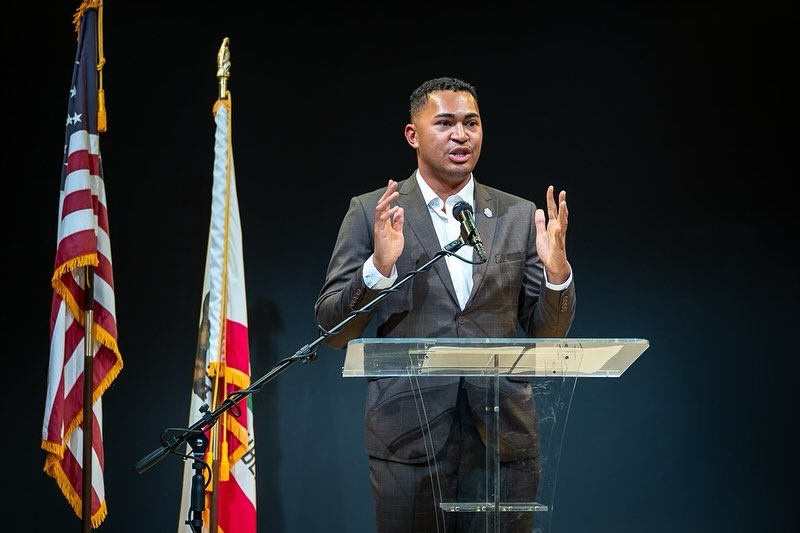
While most teenagers are busy playing video games, Triston Ezidore was busy making history.
From high school student to school board member for the Board of Education in Culver City, Ezidore talks with the LA Blade about his unconventional entry into politics with influence from George Floyd’s death and the COVID-19 pandemic, and how he made history twice while he was still a teenager.
In 2021, most of us were still at home and many people unemployed, out of school, caring for loved ones or just merely surviving the pandemic shutdowns and peak infections caused by COVID-19. During this time, many high school students lost valuable time in the classroom, being cut off from celebrating and socializing with their peers. Young Ezidore, rose above that—and more—achieving new milestones within his family and within the entire board of education in Culver City, bringing representation to queer, trans and communities of color.
Shortly after graduation, Ezidore headed to Syracuse University and from afar, he continued to tune into the Culver City school board meetings to track the progress he had made during his time as student body president in high school.
“I was still kind of watching, tuning into everything that was going on in Culver City and we knew that in order to get [the progress] right, we had to have a spotlight over the implementation,” said Ezidore.
It was during this time, that he noticed that all the progress he tried to implement during his time there, was not being implemented correctly, so he felt like it was his responsibility to track the movements a little more closely.
This is when he made the decision to return home and enroll at University of Southern California’s Dornsife College of Letters, Arts and Sciences—where he simultaneously launched his campaign for a seat on the Culver City Unified School District Board of Education.
In 2022—just one year after graduating high school—he won one of three open seats, becoming the youngest elected official in Los Angeles County at 19 years old. Then in 2023, he was elected to serve as School Board Vice President—making history as the first Black, gay man in that position as a teenager.
Though his journey into politics is “unconventional” as he puts it, Ezidore says he was radicalized to go into politics because of George Floyd’s death and the inequities made incredibly obvious by the COVID-19 pandemic.
Ezidore says that being the child of immigrants also inspired him to ultimately look into politics to gain a better understanding of how his perspective can be helpful towards other people’s experiences and educational goals.
His mother was born in Vietnam and moved to the United States after the fall of Saigon, which was the end of the Vietnam war that lasted from 1955 to 1975. Ezidore’s father is from Jamaica, so that gives Ezidore a unique perspective into the challenges and unique obstacles that many students face during their K-12 education.
Ezidore also identifies as gay and has been out since he was 18 years old.
“I find myself identifying as a gay, Black man, and I know that under this administration specifically, there has been an obsession with LGBTQ people and trans people in education,” said Ezidore. “I think historically our [education] system has not supported Black boys in education as a whole, so I find myself often pulling or tapping into those aspects of my identity.”
As a proud, gay, Black man, he felt that it was necessary to implement actual structures to support the most neglected demographic of the education system.
“We instituted the Black Student Achievement Plan that called for specific action goals to implement or to increase achievement,” said Ezidore.
This plan created mentorship and internship opportunities, a Black student council, a Black affinity group graduation and uplifted students in achieving their goals. During that time, former governor Jerry Brown stated that school districts should implement a Local Control and Accountability Plan (LACP). The plan serves as a tool to improve student outcomes with a roadmap that tracks and sets goals and plan actions, and leverages resources to guide students who were foster youth, low-income and English-learners.
“I don’t know that [Trump] is going to withhold the funding, but to me, I don’t know if I could sleep at night if I let him dictate these [educational] outcomes for the students in Culver City,” he said.
The latest update from the Supreme Court is that Trump is allowed to continue dismantling the U.S. Department of Education, worrying scholars throughout the country, with many saying that without an injunction, much of the damage can be irreversible. The Department of Education has already experienced the slashing of over 1,400 jobs and will continue to see more funding cuts due to the Reduction in Force (RIF) plan, implementing Trump’s Executive Order, which he claims will improve education and families by returning education authority to individual states.
-

 Events2 days ago
Events2 days agoMargaret Cho joins headliner lineup for Lambda Legal’s queer comedy night
-

 Television5 days ago
Television5 days agoSay ‘Hello, Hello, Hello’ to ‘Drag Race’ winner Onya Nurve
-

 Italy2 days ago
Italy2 days ago44 openly LGBTQ+ athletes to compete in Milan Cortina Winter Olympics
-

 Television2 days ago
Television2 days agoNetflix’s ‘The Boyfriend’ is more than a dating show
-
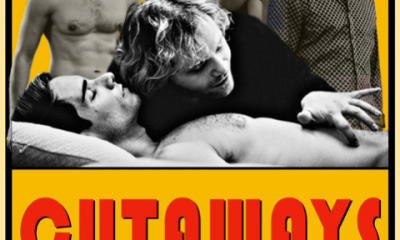
 Movies3 days ago
Movies3 days ago‘Cutaways’ and the risk queer cinema forgot
-

 Commentary5 days ago
Commentary5 days agoAre we addicted to yearning?
-

 a&e features1 day ago
a&e features1 day agoAngel McCoughtry, “Renaissance Woman”
-

 Movies1 day ago
Movies1 day ago50 years later, it’s still worth a return trip to ‘Grey Gardens’
-

 Sports3 hours ago
Sports3 hours agoBlade, Pride House LA announce 2028 Olympics partnership
-

 Arts & Entertainment2 hours ago
Arts & Entertainment2 hours ago2026 Best of LGBTQ LA Readers’ Choice Award Nominations





